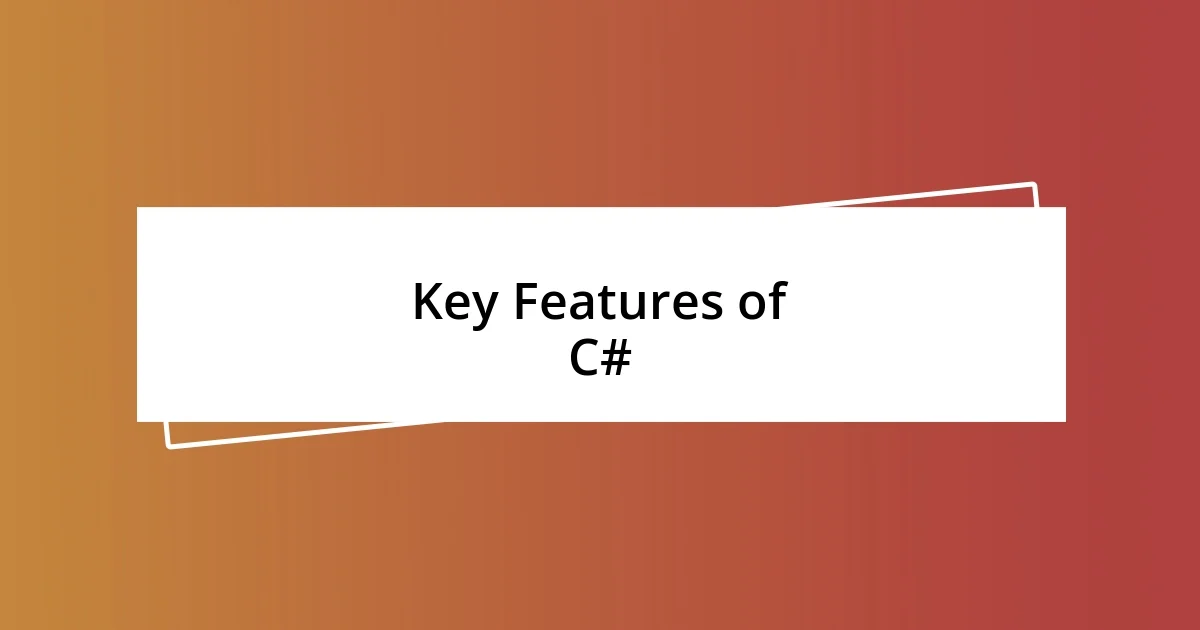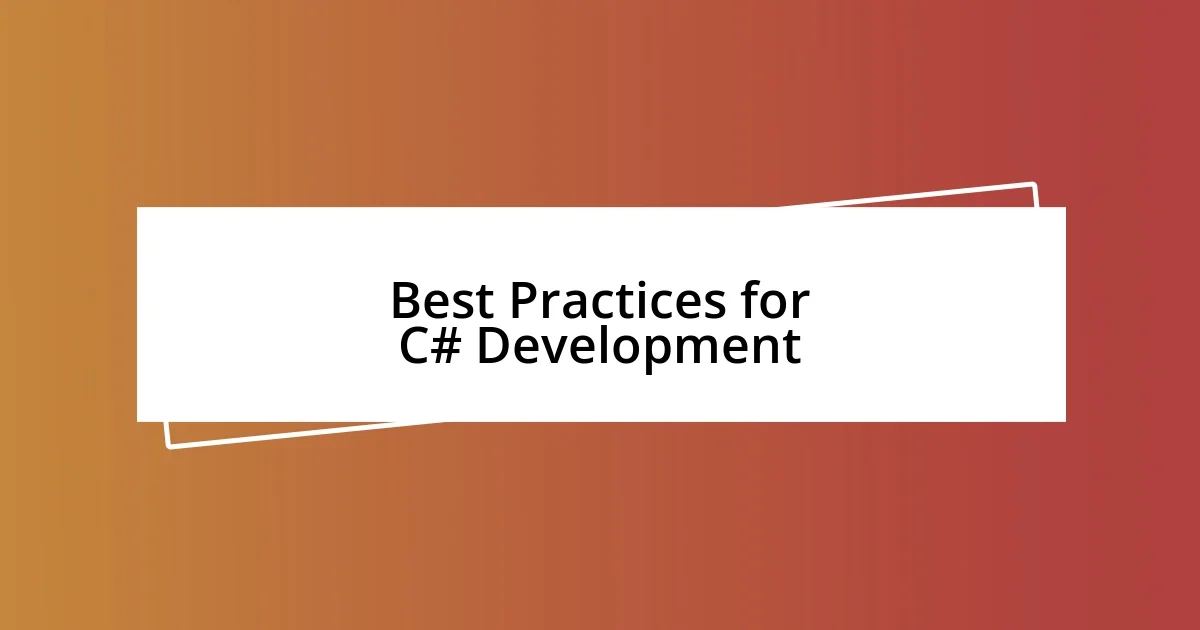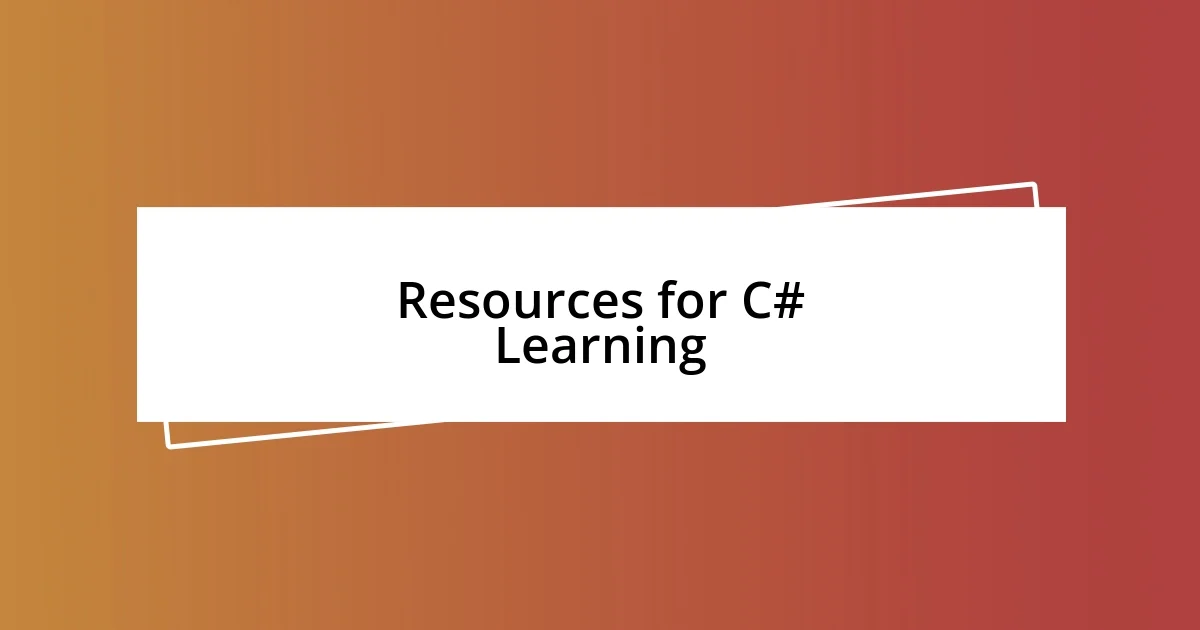Key takeaways:
- Understanding core concepts like encapsulation, data types, and exception handling greatly enhances coding effectiveness.
- Utilizing C# features such as strong type systems, asynchronous programming, and the .NET integration improves code reliability and responsiveness.
- Emphasizing best practices, like documenting code, conducting code reviews, and engaging with community resources, fosters better coding habits and growth.

Understanding C# Basics
When I first dived into C#, I was amazed by its object-oriented nature, which allows you to create complex applications by breaking them down into manageable pieces. Each class feels like a little world of its own, filled with properties and methods that breathe life into your code. Have you ever struggled to make sense of your variables and logic? Trust me, grasping the concept of encapsulation made a big difference for me—it’s like learning to write a story with well-defined characters and roles.
Looking deeper, I found the beauty of data types and control structures fascinating. The first time I had to choose between an integer, a string, or a boolean, I realized how every decision impacts your code’s behavior. It’s like cooking; using the right ingredients makes all the difference. I remember getting a little frustrated with loops until I understood how they operate like a delicate dance, allowing your code to execute actions repetitively until a condition is met.
Lastly, the concept of exception handling struck a chord with me—just like in life, mistakes happen. I recall the moment I encountered my first runtime error; it was both daunting and enlightening. Learning to use try-catch blocks not only improved my debugging skills but also taught me to anticipate and manage uncertainties, making my coding journey much smoother. Isn’t it empowering to know you can prepare for the unexpected?

Key Features of C#
C# is packed with features that make it stand out among programming languages. One such feature is its strong type system, which ensures that you catch errors early in the development process. I remember a project where I mistakenly assigned a string to an integer variable. That little oversight led to a cascade of issues until I learned to appreciate and leverage C#’s type safety—it’s like having a good friend who looks out for you and points out potential mistakes before they become big problems.
Another highlight is the built-in support for asynchronous programming. When I first got my hands on it, I felt like I had unlocked a hidden level in a game. I could run multiple tasks simultaneously without blocking the main thread, which was a game-changer for creating responsive applications. My initial attempts at managing threads were chaotic, but once I understood async and await, my code flowed more smoothly—kind of like orchestrating a symphony where each instrument plays its part without stepping on each other’s toes.
Finally, the integration with .NET is a significant advantage of using C#. This framework provides a vast collection of libraries and tools that facilitate development. I remember how excited I was when I discovered LINQ (Language Integrated Query), which allowed me to query collections in such an elegant way. It felt like switching from using a dull knife to a chef’s knife—everything became more intuitive and enjoyable. C# truly empowers developers to harness the full potential of what they create.
| Feature | Description |
|---|---|
| Strong Type System | Prevents type errors during compilation, enhancing code reliability. |
| Asynchronous Programming | Enables non-blocking operations, improving application responsiveness. |
| Integration with .NET | Provides access to extensive libraries and tools for efficient development. |

Common Mistakes to Avoid
When I was learning C#, one of the biggest pitfalls I encountered was neglecting to comment my code. It seems simple, but I often found myself staring blankly at lines of code months later, wondering what my past self was thinking. Clear, concise comments not only help others understand your logic but also serve as a lifesaver for your future self. I remember a project where I didn’t document functions properly—it turned into a mini-nightmare when I tried to make changes!
Here are some common mistakes to watch out for:
- Ignoring Code Comments: Without annotations, readability suffers, making it hard to maintain your own code later.
- Overcomplicating Logic: Simpler approaches are often more effective. Don’t write convoluted code when a straightforward solution exists.
- Neglecting Error Handling: Just like I initially did, skipping try-catch blocks can lead to unhandled exceptions that ruin your program’s flow.
- Not Utilizing Version Control: I learned this the hard way after facing a major loss of code. Missing out on version control can set you back significantly.
Another mistake I often see is not utilizing the power of debugging tools effectively. Early in my C# journey, I stubbornly used print statements to trace issues, which felt tedious and inefficient. Once I began to embrace the debugger, my coding experience changed dramatically. I felt like a detective solving mysteries instead of a frustrated coder wading through mazes of print logs.
- Underestimating the Debugger: Make friends with it! It can pinpoint where things go wrong in real-time.
- Neglecting Unit Testing: Avoid waiting until the last minute to test your code. Early testing saves headache later.
- Skipping Documentation: Having thorough documentation is critical; it keeps everyone on the same page—your future self will thank you.
- Reinventing the Wheel: Always check existing libraries or frameworks; there’s no need to create solutions from scratch if someone has already done it well.
By avoiding these common mistakes, you’ll not only save time but also enhance the quality and maintainability of your code.

Best Practices for C# Development
One of the best practices I’ve embraced in C# development is adhering to the principles of SOLID, which stands for five key design principles aimed at making software designs more understandable and flexible. I vividly recall a time when I rushed through a project and ignored these principles. While it got the job done initially, maintaining that code became a nightmare. Ever felt trapped by your own code? That’s what it was like for me, and it taught me to slow down and design my objects wisely from the start.
Another essential practice is making use of C#’s powerful features like properties and events. I used to rely heavily on public fields, thinking they were perfectly fine, but that opened the door to a host of critical issues like data corruption. Once I transitioned to properties, my code began to resemble a well-organized library where every book (or data) had its place, making it straightforward to read and maintain. Do you remember the last time you tried to make sense of a messy library? It’s frustrating, right? That’s how others might feel when they look at poorly organized code.
Finally, I can’t stress the importance of code reviews enough. When I began collaborating with peers, I was surprised to find that a fresh pair of eyes could spot issues I would have otherwise missed. It’s not just about catching mistakes; it’s about learning from each other. I always walk away from a review feeling enriched and inspired. Have you ever had a moment where someone else’s feedback changed your perspective? Engaging in constructive discussions can elevate your coding skills significantly and foster a healthy development environment.

Essential Tools for C# Coding
When diving into C# coding, one of the first tools I recommend is Visual Studio. This integrated development environment (IDE) has been my partner in crime for many projects. The robust features it offers—like IntelliSense, debugging tools, and seamless integration with Git—have saved me countless hours. Have you ever found yourself lost in a sea of code? Visual Studio’s features help illuminate the path forward, transforming frustration into clarity.
Another essential tool that I can’t live without is ReSharper. This extension for Visual Studio has transformed the way I write and maintain C# code. Initially, I was skeptical about using it, thinking that it might complicate things. But once I experienced its real-time code analysis and refactoring suggestions, I was hooked. It’s like having a seasoned mentor looking over my shoulder, nudging me to be better with every line of code. Who wouldn’t appreciate that kind of support while coding?
Lastly, I’d be remiss not to mention Postman for API testing. Early in my coding journey, I was hesitant about working with APIs, often finding them intimidating. Postman changed that perspective entirely. It simplifies the process of testing API requests and analyzing responses, making it feel much more manageable. I still remember the day I successfully integrated an API into my application, thanks to Postman. It felt like I had unlocked a new level in a video game! What tools have you found to be game-changers in your coding adventures?

Tips for Debugging in C#
When it comes to debugging in C#, I’ve found that utilizing breakpoints is a game-changer. I remember a particular instance where my code wasn’t returning the expected results. By strategically placing breakpoints, I was able to pause execution and inspect the state of variables at key points. Have you ever watched your code unfold line by line? It’s like peeking behind the curtain of a magic show, revealing how everything works.
Another vital tip is to leverage the immediate window in Visual Studio. I used to overlook this feature, thinking it was just another tool I didn’t need. However, once I started using it to test expressions and run quick code snippets during debugging sessions, it felt like I had been given a superpower. Being able to see the results in real time without leaving the debugging context brought clarity I never knew I was missing.
Finally, don’t underestimate the importance of logging. In the early days, I’d find myself logging messages sporadically. But then I decided to implement a consistent logging strategy, and it changed everything. It’s similar to keeping a diary of your coding journey; every log entry tells a part of your story. Have you ever realized how much easier it is to retrace your steps when you have a detailed history? Thoughtful logging helps create a roadmap, making it much simpler to diagnose issues when they arise.

Resources for C# Learning
When it comes to resources for learning C#, I’ve had some standout experiences that shaped my journey. For starters, Microsoft’s official documentation has served me well on countless occasions. I remember feeling overwhelmed by concepts like asynchronous programming, but their clear examples and detailed explanations helped me grasp those tricky topics. Have you ever felt lost in a new concept, only to find clarity in a well-structured resource? That’s the beauty of well-curated material.
On top of documentation, I can’t stress enough the value of online courses, especially platforms like Pluralsight or Udemy. I took a C# fundamentals course last year that transformed my understanding of object-oriented programming. The instructor’s engaging teaching style made complex topics more relatable. I often found myself eagerly awaiting the next lesson, as if I were turning the pages of a captivating novel. Are you currently exploring any courses that excite you?
And let’s not forget the community aspect. Joining forums, like Stack Overflow or dedicated C# groups on Discord, has provided me with invaluable insights. There were countless nights I spent troubleshooting code while chatting with fellow learners. It’s like having a support network right at your fingertips! At times, I would pose a question and feel the collective wisdom of the community guide me through my coding dilemmas. Have you participated in any coding communities that made a difference in your learning journey?














